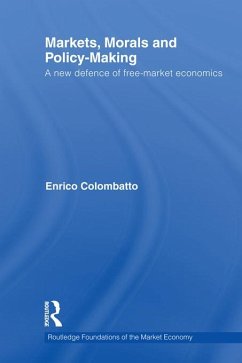Free-market economics has attempted to combine efficiency and freedom by emphasizing the need for neutral rules and meta-rules. These efforts have only been partly successful, for they have failed to address the deeper, normative arguments justifying - and limiting - coercion. This failure has thus left most advocates of free-market vulnerable to formulae which either emphasize expediency or which rely upon optimal social engineering to foster different notions of the common will and of the common good. This book offers the reader a new perspective on free-market economics, one in which the defense of markets is no longer based upon the utilitarian claim that free markets are more efficient; rather, the defense of markets rests upon the moral argument that top-down coercive policy-making is necessarily in tension with the rights-based notion of justice typical of the Western tradition.
In arguing for a consistent moral basis for the free-market view, we depart from both the Austrian and neoclassical traditions by acknowledging that rationality is not a satisfactory starting point. This rejection of rationality as the complete motivator for human economic behaviour throws constitutional economics and the law-and-economics tradition into new relief, revealing these approaches as governed by considerations derived by various notions of social efficiency, rather than by principles consistent with individual freedom, including freedom to choose.
This book shows that the solution is in fact a better understanding of the lessons taught by the Scottish Enlightenment: the role of the political context is to ensure that the individual can pursue his own ends, free from coercion. This also implies individual responsibility, respect for somebody else's preferences and for his entrepreneurial instincts. Social virtue is not absent from this understanding of politics, but rather than being defined through the priorities of policy-makers, it emerges as the outcome of interaction among self-determining individuals. The strongest and most consistent case for free-market economics, therefore, rests on moral philosophy, not on some version of static-efficiency theorizing.
This book should be of interest to students and researchers focussing on economic theory, political economics and the philosophy of economic thought, but is also written in a non-technical style making it accessible to an audience of non-economists.
In arguing for a consistent moral basis for the free-market view, we depart from both the Austrian and neoclassical traditions by acknowledging that rationality is not a satisfactory starting point. This rejection of rationality as the complete motivator for human economic behaviour throws constitutional economics and the law-and-economics tradition into new relief, revealing these approaches as governed by considerations derived by various notions of social efficiency, rather than by principles consistent with individual freedom, including freedom to choose.
This book shows that the solution is in fact a better understanding of the lessons taught by the Scottish Enlightenment: the role of the political context is to ensure that the individual can pursue his own ends, free from coercion. This also implies individual responsibility, respect for somebody else's preferences and for his entrepreneurial instincts. Social virtue is not absent from this understanding of politics, but rather than being defined through the priorities of policy-makers, it emerges as the outcome of interaction among self-determining individuals. The strongest and most consistent case for free-market economics, therefore, rests on moral philosophy, not on some version of static-efficiency theorizing.
This book should be of interest to students and researchers focussing on economic theory, political economics and the philosophy of economic thought, but is also written in a non-technical style making it accessible to an audience of non-economists.
Dieser Download kann aus rechtlichen Gründen nur mit Rechnungsadresse in A, B, BG, CY, CZ, D, DK, EW, E, FIN, F, GR, HR, H, IRL, I, LT, L, LR, M, NL, PL, P, R, S, SLO, SK ausgeliefert werden.

Enrico Colombatto erklärt wirtschaftliches Handeln
Enrico Colombattos Buch kann man auf verschiedene Weisen lesen: als moralische Verteidigung des freien Marktes, als eine Verschmelzung historischer und evolutorischer Beschreibungen wirtschaftlichen Handelns und als Kritik konsequentialistischer Wirtschaftstheorien mit Hilfe eines erweiterten Institutionenbegriffs. Man kann es aber nicht nur auf diese Weisen lesen, sondern auch mühelos. Der Autor schreibt in einer gut lesbaren Prosa und verzichtet auf den technischen Apparat, der den Genuss und das Verständnis vieler wirtschaftstheoretischer Abhandlungen schmälert.
Wie auch immer: Im Kern geht es Colombatto (Universität Turin) um ein besseres Erklären wirtschaftlichen Handelns und um die Grundlagen einer normativen Ökonomie. Der Ausgangspunkt seiner Argumentation ist die Annahme, dass die Entscheidungen der Individuen vor allem drei Faktoren ausgesetzt sind: grundsätzlicher Unsicherheit, pragmatischen Institutionen und historischen Institutionen. Mit pragmatischen Institutionen meint der Autor vor allem Interessengruppen, während er unter historischen Institutionen die prägenden und allseits anerkannten moralischen und politischen Konstanten einer Gemeinschaft in ihrer Zeit versteht.
So gesehen, könne man für die westliche Gesellschaft drei historische Perioden unterscheiden: jene der gregorianischen Revolution, die Ära des Säkularismus und das Zeitalter der gesellschaftlichen Verantwortung. Mit der Festlegung auf diese drei Epochen geht er über die Grundthese der evolutorischen Institutionenlehre hinaus. Die Einsicht, dass die Marktakteure im Rahmen gewachsener Institutionen entscheiden, reicht dem Verfasser nicht aus.
Colombatto will präzisieren, unter welchen historischen Institutionen die Akteure handeln beziehungsweise gehandelt haben. Gemeint sind dabei nicht nur die Wirtschaftsakteure, sondern auch die politischen Entscheidungsträger, die für den wirtschaftspolitischen Rahmen ihrer Zeit verantwortlich sind. Letztere brächten dem Marktgleichgewicht zu viel und der Unsicherheit zu wenig Aufmerksamkeit entgegen.
Der Verfasser stellt zweckrationale Akteure und die Bedeutung von Kosten-Nutzen-Überlegungen nicht grundsätzlich in Frage, hält aber das Bild vom traditionellen "Homo oeconomicus" für unzureichend. Der Mensch werde von mehr geprägt als zweckrationalen Abwägungen. Erfolgreiche Politik zeichne sich daher darin aus, einen Konsens über jene Grundfragen zu erzielen, die durch den jeweils letzten institutionellen Wechsel festgelegt sind. Colombatto erläutert seine Hauptthesen sehr ausführlich. Einem Kapitel über die Spannweite ökonomischen Denkens folgt eines über die Bedeutung von Zeit, Rationalität und Kooperation. Anschließend legt er sein Verständnis von Institutionen, Gesellschaftsverträgen und historischen Regeln dar. Danach analysiert er mithilfe des Law-&-Economics-Ansatzes Fragen der Legitimität, Effizienz und Normativität. Kapitel zum Verhältnis von Wachstum und Krisen sowie zu Armut und "Rent-seeking" runden das Bild ab.
Den Schluss bilden Betrachtungen zur Zukunft der Politikgestaltung. Hier schließt sich wieder der Kreis, zumindest zur ersten der drei oben genannten Lesarten. Es reiche nicht, so der Autor, die Entscheidungsträger im Rahmen utilitaristischer Überlegungen vor Staatsversagen und Interessengruppen zu warnen. Wer den freien Markt langlebig institutionalisieren wolle, dürfe nicht nur dessen Nützlichkeit ins Feld führen, sondern müsse vor allem die Legitimität marktwirtschaftlicher Grundsätze untermauern.
HARDY BOUILLON.
Enrico Colombatto: Markets, Morals and Policy-Making.
Routledge, London 2011, 285 Seiten, 85 Pfund
Alle Rechte vorbehalten. © F.A.Z. GmbH, Frankfurt am Main
'Professor Colombatto has assumed the enormous task of cleaning out the Augean stable of modern economics, a mighty task and, amazingly, very successful. This book should be read and reread and then read again by all serious economists and their patrons, even though - or especially because - this work so clearly threatens the current establishment. Colombatto has traced the development of what he considers the morass of modern economics through a detailed examination of the long intellectual history of economics and a rigorous and critical examination of some of the assumptions inherent in the prevailing positivist-quantitative paradigm. Using illustrations as diverse as development economics, constitutional theory or Law and Economics, the author is unrelentingly critical of most modern economists. His aim is no less than to return economics to a sound philosophical and moral foundation without which it will forever flounder. He has thrown down a gauntlet to the profession which they ignore at all our perils.' - Henry G. Manne, George Mason University School of Law, USA
'Displaying the erudition and insights of one steeped in the scholarship of both American and European perspectives, Colombatto has developed a powerful argument that economics and public policy must ultimately return to their original foundations (as exemplified, for example, by Smith and the Scottish Enlightenment) in moral philosophy. This notion will not please the majority of economists and policy analysts and the author is well aware of the fact, but it will be difficult for any of them not to take his arguments seriously if they choose to read this work with the care that it deserves.' - Hans Eicholz, Liberty Fund
'[...] Colombatto does an excellent job of reminding us that policymaking requires value judgments and, hence, an underlying defense of the fundamental values that analysts and policymakers hold. Even though economists claim to be value free and scientific, they often smuggle in their value judgments when they move from analysis to policy recommendations, and policymaking requires judgments of what is good and bad and what is right and wrong. Colombatto provides a valuable service in reemphasizing this point and calling for an honest, open discussion of the value systems that undergird calls for government interventions.' - The Independent Review, Spring 2013
'Economic theory emerged out of the Scottish Enlightenment as a social science with relevance for public issues. Over the past century or so, however, economics retreated into the vapid mechanics of optimization. In this imaginative and creative book, Enrico Colombatto presents a wide-ranging restatement of the moral and social foundations of economics as a publicly-relevant discipline.' - Richard Wagner, George Mason University, USA
'[...] the book Markets, Morals and Policy-Making is a plea for individualism, working judiciary and free markets, mainly from a historical perspective. It is also a plea for modest economics, not engaged in social planning but in explaining the case for freedom. [...] The book contains a rich analysis of the history of economic thoughts against the background of historical events. The author benefits from his enormous command about the economic and philosophical literature as well as his vast knowledge of the history of theorizing and policymaking. This wealth is applied to the theory of economic policy and offers a severe and understandable warning to social scientists.' - Journal of Economics, April 2013
'Displaying the erudition and insights of one steeped in the scholarship of both American and European perspectives, Colombatto has developed a powerful argument that economics and public policy must ultimately return to their original foundations (as exemplified, for example, by Smith and the Scottish Enlightenment) in moral philosophy. This notion will not please the majority of economists and policy analysts and the author is well aware of the fact, but it will be difficult for any of them not to take his arguments seriously if they choose to read this work with the care that it deserves.' - Hans Eicholz, Liberty Fund
'[...] Colombatto does an excellent job of reminding us that policymaking requires value judgments and, hence, an underlying defense of the fundamental values that analysts and policymakers hold. Even though economists claim to be value free and scientific, they often smuggle in their value judgments when they move from analysis to policy recommendations, and policymaking requires judgments of what is good and bad and what is right and wrong. Colombatto provides a valuable service in reemphasizing this point and calling for an honest, open discussion of the value systems that undergird calls for government interventions.' - The Independent Review, Spring 2013
'Economic theory emerged out of the Scottish Enlightenment as a social science with relevance for public issues. Over the past century or so, however, economics retreated into the vapid mechanics of optimization. In this imaginative and creative book, Enrico Colombatto presents a wide-ranging restatement of the moral and social foundations of economics as a publicly-relevant discipline.' - Richard Wagner, George Mason University, USA
'[...] the book Markets, Morals and Policy-Making is a plea for individualism, working judiciary and free markets, mainly from a historical perspective. It is also a plea for modest economics, not engaged in social planning but in explaining the case for freedom. [...] The book contains a rich analysis of the history of economic thoughts against the background of historical events. The author benefits from his enormous command about the economic and philosophical literature as well as his vast knowledge of the history of theorizing and policymaking. This wealth is applied to the theory of economic policy and offers a severe and understandable warning to social scientists.' - Journal of Economics, April 2013









